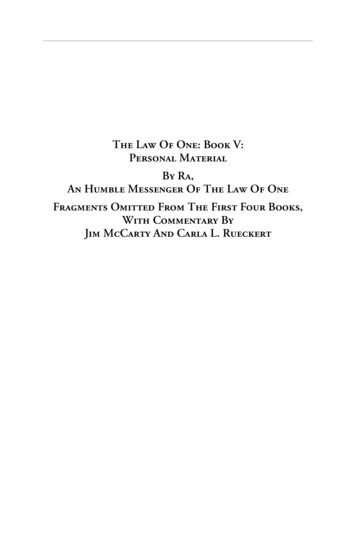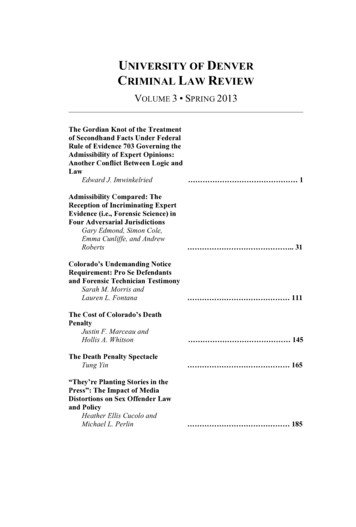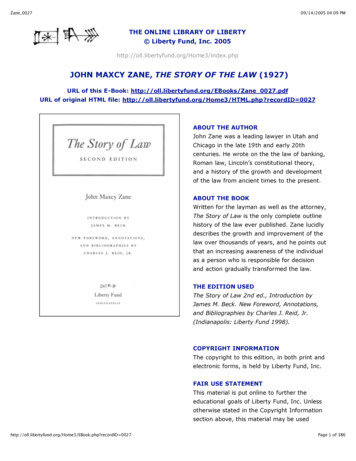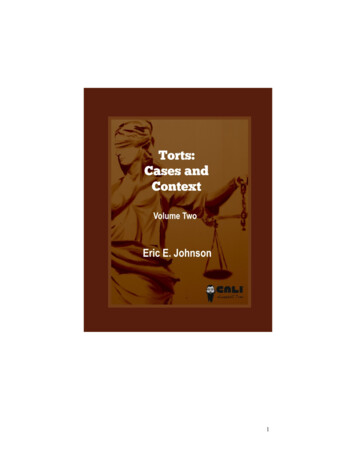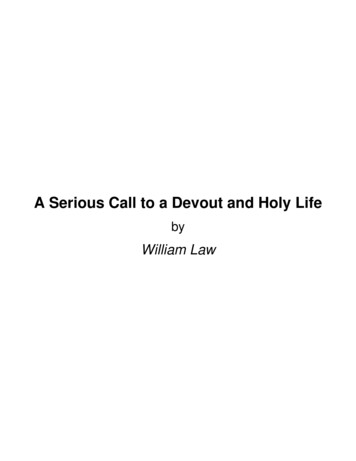
Transcription
A Serious Call to a Devout and Holy LifebyWilliam Law
About A Serious Call to a Devout and Holy Life by William LawTitle:URL:Author(s):Publisher:Date Created:CCEL Subjects:LC Call no:LC Subjects:A Serious Call to a Devout and Holy Lifehttp://www.ccel.org/ccel/law/serious call.htmlLaw, William (1686-1761)Grand Rapids, MI: Christian Classics Ethereal Library2000-07-09All; Classic; Christian Life; ProofedBV4500Practical theologyPractical religion. The Christian life
A Serious Call to a Devout and Holy LifeWilliam LawTable of ContentsAbout This Book. . . . . . . . . . . . . . . . . . . . . . . . . . . . . . . . . . . . . . p. iiTitlePage. . . . . . . . . . . . . . . . . . . . . . . . . . . . . . . . . . . . . . . . . . . p. 1Chapter I. Concerning the nature and extend of Christian devotion. . . . . p. 2Chapter II. An inquiry into the reason, why the generality of Christians fallso far short of the holiness and devotion of Christianity. . . . . . . . . . . . . p. 8Chapter III. Of the great danger and folly, of not intending to be as eminentand exemplary as we can, in the practice of all Christian virtues. . . . . . . p. 13Chapter IV. We can please God in no state or employment of life, but byintending and devoting it all to His honour and glory. . . . . . . . . . . . . . . p. 20Chapter V. Persons that are free from the necessity of labour andemployments, are to consider themselves as devoted to God in a higherdegree. . . . . . . . . . . . . . . . . . . . . . . . . . . . . . . . . . . . . . . . . . . . p. 28Chapter VI. Containing the great obligations, and the great advantages ofmaking a wise and religious use of our estates and fortunes. . . . . . . . . p. 33Chapter VII. How the imprudent use of an estate corrupts all the tempers ofthe mind, and fills the heart with poor and ridiculous passions, through thewhole course of life; represented in the character of Flavia. . . . . . . . . . p. 38Chapter VIII. How the wise and pious use of an estate naturally carrieth usto great perfection in all the virtues of the Christian life; represented in thecharacter of Miranda. . . . . . . . . . . . . . . . . . . . . . . . . . . . . . . . . . . p. 43Chapter IX. Containing some reflections upon the life of Miranda, and showinghow it may, and ought to be imitated by all her sex. . . . . . . . . . . . . . . . p. 49Chapter X. Showing how all orders and ranks of men and women, of allages, are obliged to devote themselves unto God. . . . . . . . . . . . . . . . p. 57Chapter XI. Showing how great devotion fills our lives with the greatest peaceand happiness that can be enjoyed in this world. . . . . . . . . . . . . . . . . p. 66Chapter XII. The happiness of a life wholly devoted to God farther proved,from the vanity, the sensuality, and the ridiculous poor enjoyments, whichthey are forced to take up with who live according to their own humours.This represented in various characters. . . . . . . . . . . . . . . . . . . . . . . p. 75Chapter XIII. That not only a life of vanity, or sensuality, but even the mostregular kind of life, that is not governed by great devotion, sufficiently showsits miseries, its wants and emptiness, to the eyes of all the world. Thisrepresented in various characters. . . . . . . . . . . . . . . . . . . . . . . . . . . p. 83iii
A Serious Call to a Devout and Holy LifeWilliam LawChapter XIV. Concerning that part of devotion which relates to times andhours of prayer. Of daily early prayer in the morning. How we are to improveour forms of prayer, and how to increase the spirit of devotion. . . . . . . . p. 91Chapter XV. Of chanting, or singing of psalms in our private devotions. Ofthe excellency and benefit of this kind of devotion. Of the great effects it hathupon our hearts. Of the means of performing it in the best manner. . . . . p. 104Chapter XVI. Recommending devotions at nine o'clock in the morning, calledin Scripture the third hour of the day. The subject of these prayers ishumility. . . . . . . . . . . . . . . . . . . . . . . . . . . . . . . . . . . . . . . . . . . . p. 114Chapter XVII. Showing how difficult the practice of humility is made, by thegeneral spirit and temper of the world. How Christianity requireth us to livecontrary to the world. . . . . . . . . . . . . . . . . . . . . . . . . . . . . . . . . . . p. 121Chapter XVIII. Showing how the education which men generally receive intheir youth makes the doctrines of humility difficult to be practised. The spiritof a better education represented in the character of Paternus. . . . . . . . p. 129Chapter XIX. Showing how the method of educating daughters makes itdifficult for them to enter into the spirit of Christian humility. How miserablythey are injured and abused by such an education. The spirit of a bettereducation, represented in the character of Eusebia. . . . . . . . . . . . . . . p. 138Chapter XX. Recommending devotion at twelve o'clock, called in Scripturethe sixth hour of the day. This frequency of devotion equally desirable by allorders of people. Universal love is here recommended to be the subject ofprayer at this hour. Of intercession, as an act of universal love. . . . . . . . p. 150Chapter XXI. Of the necessity and benefit of intercession, considered as anexercise of universal love. How all orders of men are to pray and intercedewith God for one another. How naturally such intercession amends andreforms the hearts of those that use it. . . . . . . . . . . . . . . . . . . . . . . . p. 163Chapter XXII. Recommending devotion at three o'clock, called in Scripturethe ninth hour of the day. The subject of prayer at this hour is resignation tothe Divine pleasure. The nature and duty of conformity to the will of God, inall our actions and designs. . . . . . . . . . . . . . . . . . . . . . . . . . . . . . . p. 174Chapter XXIII. Of evening prayer. Of the nature and necessity of examination.How we are to be particular in the confession of all our sins. How we are tofill our minds with a just horror and dread of all sin. . . . . . . . . . . . . . . . p. 182Chapter XXIV. The conclusion. Of the excellency and greatness of a devoutspirit. . . . . . . . . . . . . . . . . . . . . . . . . . . . . . . . . . . . . . . . . . . . . . p. 191Appendix A. From the Introduction to the Methuen edition, by C. Bigg,D D . . . . . . . . . . . . . . . . . . . . . . . . . . . . . . . . . . . . . . . . . . . . . . . p. 199Appendix B. From the Introduction to the Dent Everyman edition. . . . . . p. 209Appendix C. The electronic edition. . . . . . . . . . . . . . . . . . . . . . . . . . p. 211iv
A Serious Call to a Devout and Holy LifeWilliam LawIndexes. . . . . . . . . . . . . . . . . . . . . . . . . . . . . . . . . . . . . . . . . . . . p. 212Index of Scripture References. . . . . . . . . . . . . . . . . . . . . . . . . . . . p. 212v
A Serious Call to a Devout and Holy LifeWilliam Lawvi
Serious CallWilliam LawA SERIOUS CALL TOA DEVOUT AND HOLY LIFEAdapted to the State and Condition ofAll Orders of ChristiansBy WILLIAM LAW, A.M.He that hath ears to hear, let him hear.St. LUKE viii. 8.And behold, I come quickly, and my reward is with me.REV. xxii. 12.LONDON:Printed for WILLIAM INNYS,at the West End of St. Paul's.MDCCXXIX.
Serious CallWilliam LawA SERIOUS CALL TOA DEVOUT AND HOLY LIFECHAPTER IConcerning the nature and extent of Christian devotion.DEVOTION is neither private nor public prayer; but prayers, whether private or public, areparticular parts or instances of devotion. Devotion signifies a life given, or devoted, to God.He, therefore, is the devout man, who lives no longer to his own will, or the way and spirit ofthe world, but to the sole will of God, who considers God in everything, who serves God ineverything, who makes all the parts of his common life parts of piety, by doing everything in theName of God, and under such rules as are conformable to His glory.We readily acknowledge, that God alone is to be the rule and measure of our prayers; that inthem we are to look wholly unto Him, and act wholly for Him; that we are only to pray in such amanner, for such things, and such ends, as are suitable to His glory.Now let any one but find out the reason why he is to be thus strictly pious in his prayers, andhe will find the same as strong a reason to be as strictly pious in all the other parts of his life. Forthere is not the least shadow of a reason why we should make God the rule and measure of ourprayers; why we should then look wholly unto Him, and pray according to His will; but what equallyproves it necessary for us to look wholly unto God, and make Him the rule and measure of all theother actions of our life. For any ways of life, any employment of our talents, whether of our parts,our time, or money, that is not strictly according to the will of God, that is not for such ends as aresuitable to His glory, are as great absurdities and failings, as prayers that are not according to thewill of God. For there is no other reason why our prayers should be according to the will of God,why they should have nothing in them but what is wise, and holy, and heavenly; there is no otherreason for this, but that our lives may be of the same nature, full of the same wisdom, holiness, andheavenly tempers, that we may live unto God in the same spirit that we pray unto Him. Were it notour strict duty to live by reason, to devote all the actions of our lives to God, were it not absolutelynecessary to walk before Him in wisdom and holiness and all heavenly conversation, doingeverything in His Name, and for His glory, there would be no excellency or wisdom in the mostheavenly prayers. Nay, such prayers would be absurdities; they would be like prayers for wings,when it was no part of our duty to fly.As sure, therefore, as there is any wisdom in praying for the Spirit of God, so sure is it, that weare to make that Spirit the rule of all our actions; as sure as it is our duty to look wholly unto Godin our prayers, so sure is it that it is our duty to live wholly unto God in our lives. But we can nomore be said to live unto God, unless we live unto Him in all the ordinary actions of our life, unlessHe be the rule and measure of all our ways, than we can be said to pray unto God, unless our prayers2
Serious CallWilliam Lawlook wholly unto Him. So that unreasonable and absurd ways of life, whether in labour or diversion,whether they consume our time, or our money, are like unreasonable and absurd prayers, and areas truly an offence unto God.It is for want of knowing, or at least considering this, that we see such a mixture of ridicule inthe lives of many people. You see them strict as to some times and places of devotion, but whenthe service of the Church is over, they are but like those that seldom or never come there. In theirway of life, their manner of spending their time and money, in their cares and fears, in their pleasuresand indulgences, in their labour and diversions, they are like the rest of the world. This makes theloose part of the world generally make a jest of those that are devout, because they see their devotiongoes no farther than their prayers, and that when they are over, they live no more unto God, till thetime of prayer returns again; but live by the same humour and fancy, and in as full an enjoymentof all the follies of life as other people. This is the reason why they are the jest and scorn of carelessand worldly people; not because they are really devoted to God, but because they appear to haveno other devotion but that of occasional prayers.Julius1 is very fearful of missing prayers; all the parish supposes Julius to be sick, if he is notat Church. But if you were to ask him why he spends the rest of his time by humour or chance?why he is a companion of the silliest people in their most silly pleasures? why he is ready for everyimpertinent2 entertainment and diversion? If you were to ask him why there is no amusement tootrifling to please him? why he is busy at all balls and assemblies? why he gives himself up to anidle, gossiping conversation? why he lives in foolish friendships and fondness for particular persons,that neither want nor deserve any particular kindness? why he allows himself in foolish hatredsand resentments against particular persons without considering that he is to love everybody ashimself? If you ask him why he never puts his conversation, his time, and fortune, under the rulesof religion? Julius has no more to say for himself than the most disorderly person. For the wholetenor of Scripture lies as directly against such a life, as against debauchery and intemperance: hethat lives such a course of idleness and folly, lives no more according to the religion of Jesus Christ,than he that lives in gluttony and intemperance.If a man was to tell Julius that there was no occasion for so much constancy at prayers, and thathe might, without any harm to himself, neglect the service of the Church, as the generality of peopledo, Julius would think such a one to be no Christian, and that he ought to avoid his company. Butif a person only tells him, that he may live as the generality of the world does, that he may enjoyhimself as others do, that he may spend his time and money as people of fashion do, that he mayconform to the follies and frailties of the generality, and gratify his tempers and passions as mostpeople do, Julius never suspects that man to want a Christian spirit, or that he is doing the devil'swork. And if Julius was to read all the New Testament from the beginning to the end, he wouldfind his course of life condemned in every page of it.And indeed there cannot anything be imagined more absurd in itself, than wise, and sublime,and heavenly prayers, added to a life of vanity and folly, where neither labour nor diversions, neithertime nor money, are under the direction of the wisdom and heavenly tempers of our prayers. If wewere to see a man pretending to act wholly with regard to God in everything that he did, that wouldneither spend time nor money, nor take any labour or diversion, but so far as he could act according12Julius: the suggestion is, that Caesar is the worldly power as opposed to God.impertinent unsuitable, incongruous, uncongenial.3
Serious CallWilliam Lawto strict principles of reason and piety, and yet at the same time neglect all prayer, whether publicor private, should we not be amazed at such a man, and wonder how he could have so much follyalong with so much religion?Yet this is as reasonable as for any person to pretend to strictness in devotion, to be careful ofobserving times and places of prayer, and yet letting the rest of his life, his time and labour, histalents and money, be disposed of without any regard to strict rules of piety and devotion. For it isas great an absurdity to suppose holy prayers, and Divine petitions, without a holiness of life suitableto them, as to suppose a holy and Divine life without prayers.Let any one therefore think how easily he could confute a man that pretended to great strictnessof life without prayer, and the same arguments will as plainly confute another, that pretends tostrictness of prayer, without carrying the same strictness into every other part of life. For to be weakand foolish in spending our time and fortune, is no greater a mistake, than to be weak and foolishin relation to our prayers. And to allow ourselves in any ways of life that neither are, nor can beoffered to God, is the same irreligion, as to neglect our prayers, or use them in such a manner asmake them an offering unworthy of God.The short of the matter is this; either reason and religion prescribe rules and ends to all theordinary actions of our life, or they do not: if they do, then it is as necessary to govern all our actionsby those rules, as it is necessary to worship God. For if religion teaches us anything concerningeating and drinking, or spending our time and money; if it teaches us how we are to use and contemnthe world; if it tells us what tempers we are to have in common life, how we are to be disposedtowards all people; how we are to behave towards the sick, the poor, the old, the destitute; if it tellsus whom we are to treat with a particular love, whom we are to regard with a particular esteem; ifit tells us how we are to treat our enemies, and how we are to mortify and deny ourselves; he mustbe very weak that can think these parts of religion are not to be observed with as much exactness,as any doctrines that relate to prayers.It is very observable, that there is not one command in all the Gospel for public worship; andperhaps it is a duty that is least insisted upon in Scripture of any other. The frequent attendance atit is never so much as mentioned in all the New Testament. Whereas that religion or devotion whichis to govern the ordinary actions of our life is to be found in almost every verse of Scripture. Ourblessed Saviour and His Apostles are wholly taken up in doctrines that relate to common life. Theycall us to renounce the world, and differ in every temper and way of life, from the spirit and theway of the world: to renounce all its goods, to fear none of its evils, to reject its joys, and have novalue for its happiness: to be as new-born babes, that are born into a new state of things: to live aspilgrims in spiritual watching, in holy fear, and heavenly aspiring after another life: to take up ourdaily cross, to deny ourselves, to profess the blessedness of mourning, to seek the blessedness ofpoverty of spirit: to forsake the pride and vanity of riches, to take no thought for the morrow, tolive in the profoundest state of humility, to rejoice in worldly sufferings: to reject the lust of theflesh, the lust of the eyes, and the pride of life: to bear injuries, to forgive and bless our enemies,and to love mankind as God loveth them: to give up our whole hearts and affections to God, andstrive to enter through the strait gate into a life of eternal glory.This is the common devotion which our blessed Saviour taught, in order to make it the commonlife of all Christians. Is it not therefore exceeding strange that people should place so much pietyin the attendance upon public worship, concerning which there is not one precept of our Lord's tobe found, and yet neglect these common duties of our ordinary life, which are commanded in every4
Serious CallWilliam Lawpage of the Gospel? I call these duties the devotion of our common life, because if they are to bepractised, they must be made parts of our common life; they can have no place anywhere else.If contempt of the world and heavenly affection is a necessary temper of Christians, it isnecessary that this temper appear in the whole course of their lives, in their manner of using theworld, because it can have no place anywhere else. If self-denial be a condition of salvation, allthat would be saved must make it a part of their ordinary life. If humility be a Christian duty, thenthe common life of a Christian is to be a constant course of humility in all its kinds. If poverty ofspirit be necessary, it must be the spirit and temper of every day of our lives. If we are to relievethe naked, the sick, and the prisoner, it must be the common charity of our lives, as far as we canrender ourselves able to perform it. If we are to love our enemies, we must make our common lifea visible exercise and demonstration of that love. If content and thankfulness, if the patient bearingof evil be duties to God, they are the duties of every day, and in every circumstance of our life. Ifwe are to be wise and holy as the new-born sons of God, we can no otherwise be so, but byrenouncing everything that is foolish and vain in every part of our common life. If we are to be inChrist new creatures, we must show that we are so, by having new ways of living in the world. Ifwe are to follow Christ, it must be in our common way of spending every day.Thus it is in all the virtues and holy tempers of Christianity; they are not ours unless they bethe virtues and tempers of our ordinary life. So that Christianity is so far from leaving us to live inthe common ways of life, conforming to the folly of customs, and gratifying the passions andtempers which the spirit of the world delights in, it is so far from indulging us in any of these things,that all its virtues which it makes necessary to salvation are only so many ways of living above andcontrary to the world, in all the common actions of our life. If our common life is not a commoncourse of humility, self-denial, renunciation of the world, poverty of spirit, and heavenly affection,we do not live the lives of Christians.But yet though it is thus plain that this, and this alone, is Christianity, a uniform, open, andvisible practice of all these virtues, yet it is as plain, that there is little or nothing of this to be found,even amongst the better sort of people. You see them often at Church, and pleased with finepreachers: but look into their lives, and you see them just the same sort of people as others are, thatmake no pretences to devotion. The difference that you find betwixt them, is only the differenceof their natural tempers. They have the same taste of the world, the same worldly cares, and fears,and joys; they have the same turn of mind, equally vain in their desires. You see the same fondnessfor state and equipage, the same pride and vanity of dress, the same self-love and indulgence, thesame foolish friendships, and groundless hatreds, the same levity of mind, and trifling spirit, thesame fondness for diversions, the same idle dispositions, and vain ways of spending their time invisiting and conversation, as the rest of the world, that make no pretences to devotion.I do not mean this comparison, betwixt people seemingly good and professed rakes, but betwixtpeople of sober lives. Let us take an instance in two modest women: let it be supposed that one ofthem is careful of times of devotion, and observes them through a sense of duty, and that the otherhas no hearty concern about it, but is at Church seldom or often, just as it happens. Now it is a veryeasy thing to see this difference betwixt these persons. But when you have seen this, can you findany farther difference betwixt them? Can you find that their common life is of a different kind?Are not the tempers, and customs, and manners of the one, of the same kind as of the other? Dothey live as if they belonged to different worlds, had different views in their heads, and differentrules and measures of all their actions? Have they not the same goods and evils? Are they not5
Serious CallWilliam Lawpleased and displeased in the same manner, and for the same things? Do they not live in the samecourse of life? does one seem to be of this world, looking at the things that are temporal, and theother to be of another world, looking wholly at the things that are eternal? Does the one live inpleasure, delighting herself in show or dress, and the other live in self-denial and mortification,renouncing everything that looks like vanity, either of person, dress, or carriage? Does the onefollow public diversions, and trifle away her time in idle visits, and corrupt conversation, and doesthe other study all the arts of improving her time, living in prayer and watching, and such goodworks as may make all her time turn to her advantage, and be placed to her account at the last day?Is the one careless of expense, and glad to be able to adorn herself with every costly ornament ofdress, and does the other consider her fortune as a talent given her by God, which is to be improvedreligiously, and no more to be spent on vain and needless ornaments than it is to be buried in theearth? Where must you look, to find one person of religion differing in this manner, from anotherthat has none? And yet if they do not differ in these things which are here related, can it with anysense be said, the one is a good Christian, and the other not?Take another instance amongst the men? Leo3 has a great deal of good nature, has kept whatthey call good company, hates everything that is false and base, is very generous and brave to hisfriends; but has concerned himself so little with religion that he hardly knows the difference betwixta Jew and a Christian.Eusebius,4 on the other hand, has had early impressions of religion, and buys books of devotion.He can talk of all the feasts and fasts of the Church, and knows the names of most men that havebeen eminent for piety. You never hear him swear, or make a loose jest; and when he talks ofreligion, he talks of it as of a matter of the last concern.Here you see, that one person has religion enough, according to the way of the world, to bereckoned a pious Christian, and the other is so far from all appearance of religion, that he may fairlybe reckoned a Heathen; and yet if you look into their common life; if you examine their chief andruling tempers in the greatest articles of life, or the greatest doctrines of Christianity, you will notfind the least difference imaginable.Consider them with regard to the use of the world, because that is what everybody can see.Now to have right notions and tempers with relation to this world, is as essential to religion asit have right notions of God. And it is as possible for a man to worship a crocodile, and yet be apious man, as to have his affections set upon this world, and yet be a good Christian.But now if you consider Leo and Eusebius in this respect, you will find them exactly alike,seeking, using, and enjoying, all that can be got in this world in the same manner, and for the sameends. You will find that riches, prosperity, pleasures, indulgences, state equipages, and honour, arejust as much the happiness of Eusebius as they are of Leo. And yet if Christianity has not changeda man's mind and temper with relation to these things, what can we say that it has done for him?For if the doctrines of Christianity were practised, they would make a man as different from otherpeople, as to all worldly tempers, sensual pleasures, and the pride of life, as a wise man is differentfrom a natural5; it would be as easy a thing to know a Christian by his outward course of life, as it345Leo, the lion probably suggesting the favourite of Society.Eusebius, pious in the Ecclesiastical sense, as the name of the first Church historian, but without reference to that historian'scharacter. cf. Eusebia.a natural, i.e. an idiot.6
Serious CallWilliam Lawis now difficult to find anybody that lives it. For it is notorious that Christians are now not onlylike other men in their frailties and infirmities, this might be in some degree excusable, but thecomplaint is, they are like Heathens in all the main and chief articles of their lives. They enjoy theworld, and live every day in the same tempers, and the same designs, and the same indulgences,as they did who knew not God, nor of any happiness in another life. Everybody that is capable ofany reflection, must have observed, that this is generally the state even of devout people, whethermen or women. You may see them different from other people, so far as to times and places ofprayer, but generally like the rest of the world in all the other parts of their lives: that is, addingChristian devotion to a Heathen life. I have the authority of our blessed Saviour for this remark,where He says, "Take no thought, saying, What shall we eat? or, What shall we drink? or,Wherewithal shall we be clothed? For after all these things do the Gentiles seek." [Matt. vi. 31, 32]But if to be thus affected even with the necessary things of this life, shows that we are not yet of aChristian spirit, but are like the Heathens, surely to enjoy the vanity and folly of the world as theydid, to be like them in the main chief tempers of our lives, in self-love and indulgence, in sensualpleasures and diversions, in the vanity of dress, the love of show and greatness, or any other gaudydistinctions of fortune, is a much greater sign of an Heathen temper. And, consequently, they whoadd devotion to such a life, must be said to pray as Christians, but live as Heathens.7
Serious CallWilliam LawCHAPTER IIAn inquiry into the reason, why the generality of Christians fall so far short of the holiness anddevotion of Christianity.IT MAY now be reasonably inquired, how it comes to pass, that the lives even of the bettersort of people are thus strangely contrary to the principles of Christianity?But before I give a direct answer to this, I desire it may also be inquired, how it comes to passthat swearing is so common a vice among Christians? It is indeed not yet so common among women,as it is among men. But among men this sin is so common that perhaps there are more than two inthree that are guilty of it through the whole course of their lives, swearing more or less, just as ithappens, some constantly, others only now and then as it were by chance.Now I ask, how comes it, that two in three of the men are guilty of so gross and profane a sinas this is? There is neither ignorance nor human infirmity to plead for it; it is against an expresscommandment, and the most plain doctrines of our blessed Saviour.Do but now find the reason why the generality of men live in this notorious vice, and then youwill have found the reason why the generality even of the better sort of people live so contrary toChristianity.Now the reason of common swearing is this; it is because men have not so much as the intentionto please God in all their actions. For let a man but have so much piety as to intend to please Godin all the actions of his life, as the happiest and best thing in the world, and then he will never swearmore. It will be as impossible for him to swear, whilst he feels this intention within himself, as itis impossible for a man that intends to please his prince, to go up and abuse him to his face.It seems but a small and necessary part of piety to have such a sincere intention as this; and thathe has no
A Serious Call to a Devout and Holy Life by William Law. This document has been generated from XSL (Extensible Stylesheet Language) source w

